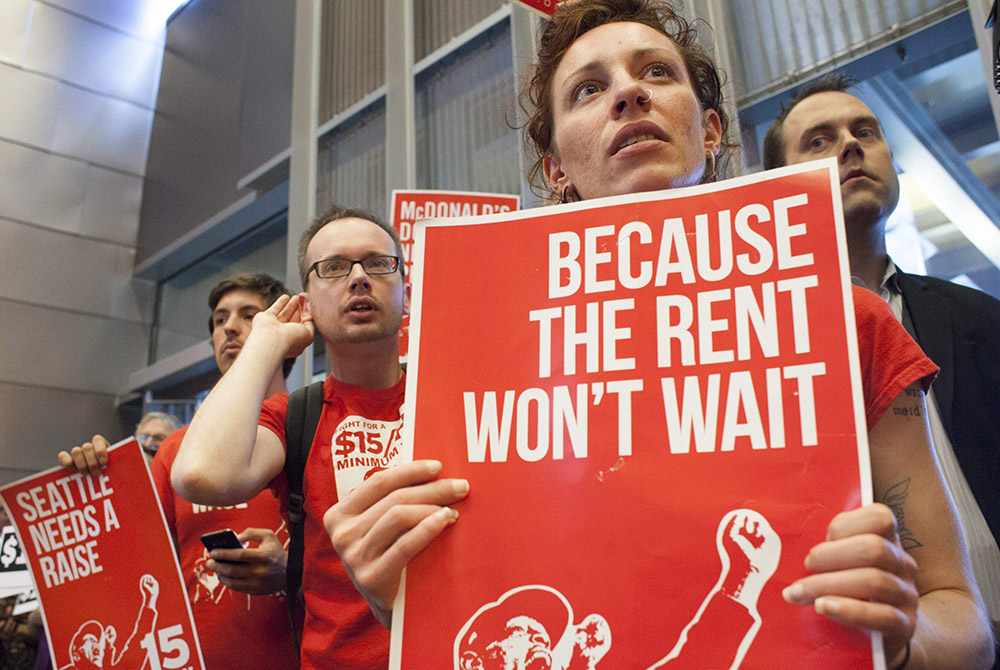
Labor activists hold signs during a Seattle City Council meeting in which the council voted on raising the minimum wage to $15 per hour, June 2, 2014, in Seattle. (CNS/David Ryder, Reuters)
Monday night, Tucker Carlson began his show with an eight-minute rant about the power outages in Texas and how they were the result of wind turbines freezing in the cold. The problem? It wasn't true, according to the Electric Reliability Council of Texas, which said problems with natural gas were the principal culprit. The next night, Carlson began his show talking about the importance of truthfulness. He offered no apology for his screed the previous night.
From NPR, a look at minimum wage increases and McDonald's, which is a perfect laboratory for analyzing the effects of such increases. Turns out that the increased cost gets passed on to the customers. The researchers say they could not analyze the effect on employment of a minimum wage hike, but they did find that there was no correlation between an increase in the minimum wage and a shift to automation. As well, if the increase in labor cost is passed on to the customer, there is no additional reason to expect a rise in job losses just because the minimum wage went up.
In The New York Times, a report on the decision by Ford Motor that it will only be offering electric battery and plug-in cars in Europe beginning in 2026. Additionally, by 2030, all of its cars sold there will run on batteries. If they can do it there, why can't we do it here?
From Reuters, a report on a letter from religious leaders in Puerto Rico and in the States, urging President Joe Biden to withdraw a lawsuit filed by his predecessor, Donald Trump, that sought to bar $2.3 billion in supplemental assistance to 300,000 aged and infirm Puerto Ricans. The religious leaders also urged the president to take other actions to alleviate the suffering on the island, which was acute before the pandemic hit.
Advertisement
In The Washington Post, Charles Lane argues that if the West boycotts the 2022 Winter Olympics in Beijing, it might be the death knell for all future Olympics, a scenario he says he would welcome. He is right that the Olympics have become embroiled in corruption, both fiscal and political, and that has been the case for years. But there is a better solution: Give the Summer Olympics to Athens permanently — the still struggling Greek economy could use the infusion of cash — and the Winter Olympics permanently in Oslo, if you want a city, or Cortina d'Ampezzo, if you want more of an Alpine village. You would not have the insane expense of building pricey venues like velodromes and speed skating rinks and bobsled runs every four years, eliminating much of the petty corruption. And, Greece, Norway or Italy are not likely to be embroiled in the kinds of human rights abuses we are seeing in China, or that we witnessed in Russia, which hosted the Winter Olympics seven years ago, removing the stench of moral corruption.
The German nation has earned a reputation for outstanding engineering, but the new Berlin Brandenburg Airport is turning out to be the exception that proves the rule. According to this story at Onemileatatime.com, the staff at the security checkpoints are routinely getting electric shocks from the equipment, some bad enough that they require medical attention. And, in an effort to make the check-in counters accessible to the trains from downtown, a large open space was created for the stairs and escalators. Unfortunately, the train tunnels conduct bitterly cold air into this space and it is so frigid, they have had to close some of the check-in counters. Oops. I guess the airport will not be debuting on the new, and highly addictive, Smithsonian Channel show "How Did They Build That?"
On the other hand, Architectural Digest looks at a great feat of American engineering, the Boeing 747, which is being retired by most airlines. I can remember the first time I saw one of these magnificent planes at JFK Airport in New York, easily twice the size of other planes and so sleek. Many of these giants will be converted to use as cargo planes, which was the original idea behind the design, so you may still see them at airports. I do not know about anyone else, but I prefer crossing the ocean in a plane with four, not two, engines, so I will miss the piece of mind the 747s provided too.







